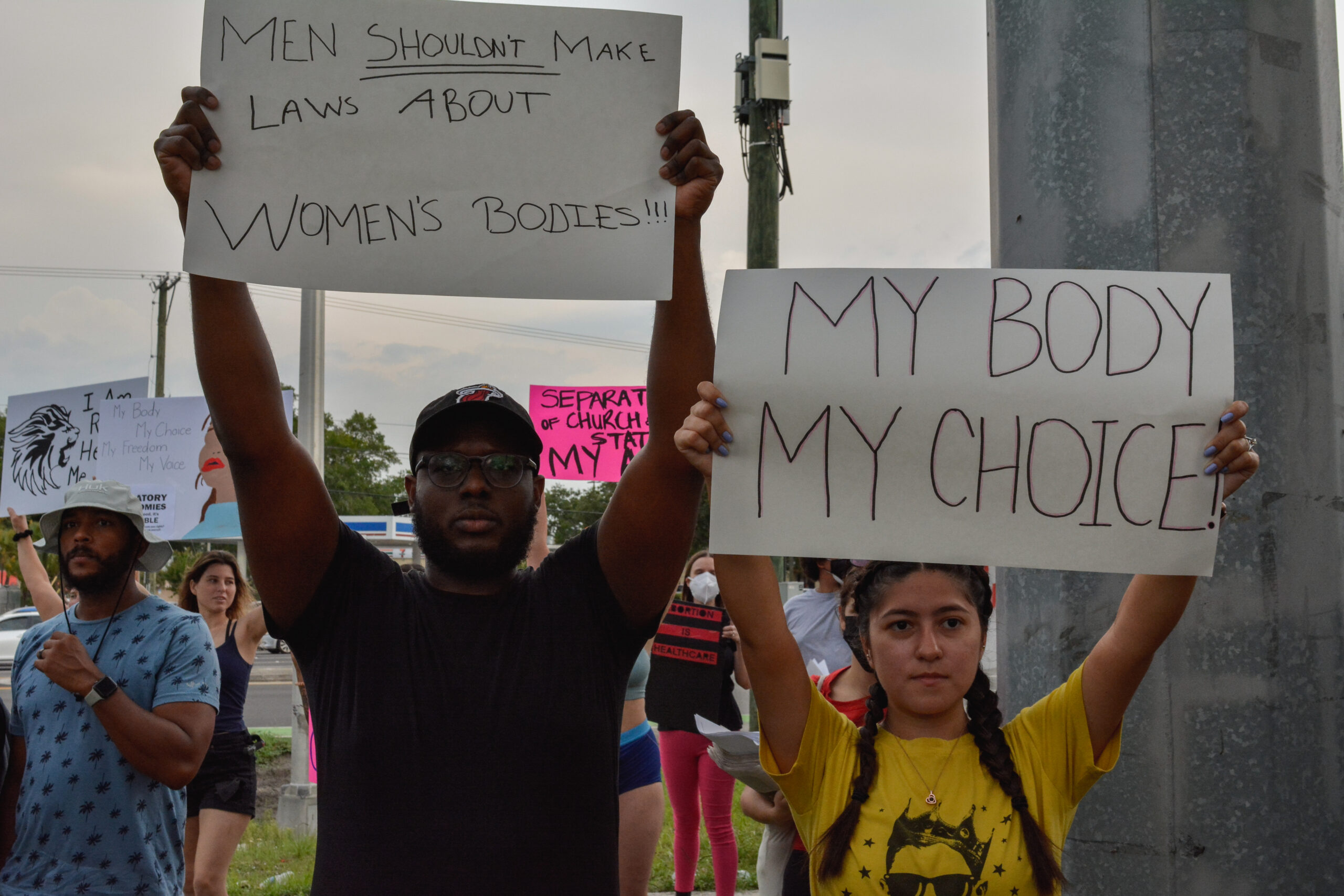Roe v. Wade overturning provokes fears among some students

With the overturning of the 1973 landmark Supreme Court Roe v. Wade decision, which protected access to abortions at the federal level for the past 50 years, some impacted students had concerns for a post-Roe America, ranging from future health crises to its effects on disadvantaged communities.
Shelby Catroneo, a sophomore health sciences major, said the overturning is a regression in the women’s rights movement.
“I honestly don’t understand why after 50 years the government decided to allow this act to happen,” Catroneo said. “I feel ashamed of this country for allowing this to happen. This can cause a big ripple effect on the progress of equality for women.”
Following the overruling, Kayla Stump, a senior humanities and cultural studies major, echoed similar sentiments of frustrations. She said she has lost her faith in the government.
“It’s scary and only reinforces my distrust in [governing] bodies,” Stump said. “I feel like a commodity rather than a human as those who are in power bid and sell my health care at the right price.”
As of 2022, 61% of Americans supported abortions being available in all or most cases, according to the Pew Research Center. These numbers have not changed significantly since 1995, when 60% of Americans approved of abortions in all or most instances.
Since the overhaul of the 50-year-old court ruling, the Supreme Court’s approval rating has sunk to 25%, according to Forbes. The rating has achieved record lows since the 30% confidence level in 2014, and dropped from a 36% approval rating in 2021.
Conversely, Francisco Vera, a junior mechanical engineering major, said he was enthused upon hearing about the overturning.
“[I felt] joy,” Vera said. “I believe it will bring great relief to most of the people I know, while some will be freaking out.”
Soon after the announcement, members of the anti-abortion movement began celebrating across the nation in churches, homes and pregnancy clinics, according to The New York Times.
Thousands of others who opposed the ruling protested across the nation. Demonstrators also gathered outside of Supreme Court Justice Clarence Thomas’s home in Fairfax County, Virginia, who voted in favor of the decision.
Junior biomedical sciences major Simone Perciballi mentioned concerns about the impact the reversal may have on survivors of sexual assault. From her own experiences with sexual violence, Perciballi said she believes the overruling could impact survivors.
“It’s taken me four years to heal from the first rape, and last week I had the Supreme Court violate me in the exact same way,” Perciballi said. “It’s not a hypothetical that women may be raped, it’s not a 1%. [There’s] millions unreported [because of] fear. It’s a society that would rather protect the seed of a rapist than the woman forced to nurture it.”
The Guttmacher Institute predicts that with the fall of Roe, 40 abortion bans will be passed across 26 states, 10 of which will include exceptions for rape and incest. States like Alabama, Arkansas and Florida already have bans in place that prohibit abortions caused by rape or incest.
Ozge Tutar, a senior computer sciences major, also criticized the decision as a threat to pregnant people’s health and overall well-being.
“It will make everyone’s lives harder and women will be more on edge and their physical and mental health at risk,” Tutar said.
Under abortion bans, even with exceptions made for maternal and fetal health anomalies, health care providers face the decision of avoiding legal liabilities versus providing the care necessary to treat pregnancy complications. A 2021 study from the University of Colorado found that maternal mortality rates may rise to 21%, and as much as 33% in Black women, under a total abortion ban.
Unsafe abortions sought out illegally were another concern among many students. The World Health Organization stated that 30 out of 100,000 pregnant people die due to unsafe abortions, and up to 220 out of 100,000 in developing regions.
Lack of access to abortions may also pose a threat to maternal mental health. The American Psychological Association (APA) has found that, when denied an abortion, pregnant individuals were more likely to deal with anxiety, low self esteem and overall decreased satisfaction with their lives.
Several students also predicted an increase in fetal health complications in the case of a total abortion ban. A 2021 Arizona law made it a felony to abort a fetus with a viable genetic anomaly.
Emphasis was also placed on the effect abortion bans will have on disadvantaged communities, including Black and Hispanic people, who receive abortions at higher rates than white people. As minority groups that already struggle with access to health care and higher poverty rates, Black and Hispanic communities will be more heavily affected by abortion bans.
“If Roe v. Wade now, what’s next? How many more progressive rulings are going to be unfurled to benefit white, male, cis and Christian agendas?” Stump said. “Women, BIPOC communities and those who identify as a woman are continually disadvantaged by those who have ample privilege and access.”
Pregnant people who wished to receive an abortion, but were unable to, are also more likely to experience lower credit scores, poverty, bankruptcy and evictions, according to the APA.
Some female students said they hoped to protest the move or support others opposing the overruling.
“I’ve been calm and rational,” Perciballi said. “I am full of anger and nausea.”







